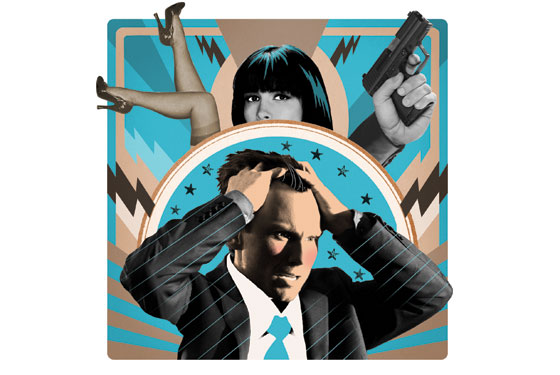
You will remember poor Arnold Schwarzenegger in Total Recall, at a loss on Mars, unsure whether his flashbacks actually belonged to him or had been fabricated elsewhere and plugged into his cerebellum like a DVD. Like Blade Runner and Minority Report, Total Recall was based on a science fiction by the paranoid pillhead Philip K. Dick—in this case, his short story “We Can Remember It for You Wholesale.” Dick, for whom Carlos Castaneda, L. Ron Hubbard, and Olivia Newton-John were just as important as Mozart, Wittgenstein, and Dostoyevsky (although not perhaps as crucial as amphetamines), had intuited early in life that objective reality is a scam; that we are surrounded by simulacra, lied to by robots and/or programmed by aliens. The split personality played by Christian Slater in My Own Worst Enemy takes a little longer to figure out that there’s something wrong with his wiring, but by the end of the pilot episode, beside himself as it were, he is communicating with his alter ego by computer disk and they’ve both slept with Mädchen Amick.
Henry (think Dr. Jekyll) is a suburban Los Angeles homebody with a wife (Amick), two children, and a salesman’s job that takes him to places like Albany. Edward (think Mr. Hyde) is a licensed-to-kill spy equally at home in Paris, Moscow, or his very own weapons room, who can stay underwater for five minutes and run a mile in four. They are a government experiment under perpetual surveillance by the sourpuss scientist-bureaucrat Alfre Woodard. And Slater, whose career has gone pretty much downhill since Heathers (1989) and Pump Up the Volume (1990), is surprisingly perfect as both of them, adjusting not much more than the brow of an eye, the curl of a lip, and the hiss of a sibilant to indicate the seismic shift from James Bond to Willy Loman. Or is Henry really Walter Mitty, fantasizing international intrigue as a cure for his midlife blahs?
Anyway, these two selves, which are supposed to be separated by hermetic seal, start leaking into each other in dreams and lights and sudden sounds, not to mention the continuing menace of a Russian operative named Uzi, who blames video games for the decline in standards for torture. And the result, which could have been just one more feckless exercise in Philip K. Dicking around, is instead provocative and absorbing. It is as if, while Slater is trying to decide who he really is behind his seedy Jack Nicholson mask, we were watching ourselves on escapist television, behaving in bad-boy ways our mothers and wives would deplore.
On the other hand, as Dr. Jacob Hood, the brilliant biophysicist and special adviser to the FBI on Eleventh Hour who is omniscient about everything from cryogenics to genetically modified food, Rufus Sewell is so super-goody he deserves, if not an obelisk, at least a postage stamp. Of course, like Hugh Laurie’s House and Emily Deschanel’s Bones, he lacks in basic social skills and so runs roughshod over other people’s feelings. But we forgive him because, well, he’s smarter than they are, whether he is construing the mystery of dead mothers and cloned babies all over Seattle or determining why, in a small town in Georgia, so many 11-year-old boys are dying of heart attacks. While Hood is being smarter than the rest of us, Marley Shelton plays Rachel, the blonde-bodyguard robochick who shoots people for him, sort of like Cameron on Terminator: The Sarah Connor Chronicles. I’m tempted to suggest that Eleventh Hour will only be worth watching if it acquires a sorely needed sense of humor, but maybe I’m missing some laughter in the dark. The case of the dead 11-year-olds, after all, involved not only foxglove and Colorado River toads but also, unless I misunderstood, grading on a curve in elementary school, so No Child Would Ever Be Left Behind.
My Own Worst Enemy
NBC. Mondays at 10 p.m.
Eleventh Hour
CBS. Thursdays at 10 p.m.